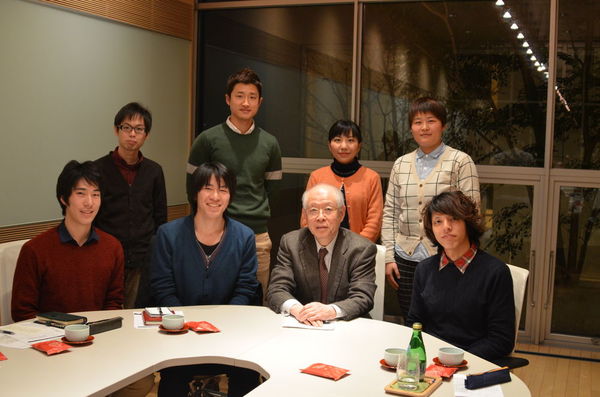University Professor Ryoji Noyori, President of RIKEN and a Nobel Laureate in Chemistry (2001), has contributed numerous articles to "Kamitsubute" in Chunichi Shimbun since January 2013. Based on these articles, he holds regular academic talks with students at Nagoya University. At the Thirteenth Noyori Academy Salon, held on February 9, 2015, Prof. Noyori and six students from different academic fields openly discussed the topic of "Mentor and Me." In "Kamitsubute," Prof. Noyori claimed that mentors who can really be respected by students are neither lecturers, who are good just at teaching, nor great researchers, who have published a lot of articles, but "savants," who can be objects of admiration and reverence for students.

Takanori Okamoto, a freshman at the School of Agricultural Sciences
How can we meet such great mentors?
Prof. Noyori
Great mentors send great pupils into the world or great pupils come to such great mentors. Mentors are evaluated based on how they contribute to the growth of their pupils who participate actively in society. Even if awarded solitarily for their mentorship, they should not be measured as educators.
Sangeun Lee, a sophomore at the School of Engineering
What can we do to become researchers, who can contribute to society as well as do interesting things?
Prof. Noyori
Though it might seem paradoxical, you can do what you like, which can be for society. The important thing is education to highly motivate young people. If they are educated to become a member to help society by parents, they are naturally interested in such a thing and will choose such a theme for their studies.
Xu Wang, a third-year PhD student at the Graduate School of Education and Human Development
What do you suggest regarding the development of physical strength or exercise?
Prof. Noyori
I actually practiced judo and played rugby. By exercising, we can cultivate patience and concentration. Especially, martial arts, such as judo, kendo, and kyudo (Japanese archery), teach us a way of life and a manner; furthermore, it is important to inherit our traditional culture.
Shun Arai, a senior at the School of Science
I would like to know how Prof. Sachio Hayakawa, introduced in "Kamitsubute," was like?
Prof. Noyori
Prof. Sachio Hayakawa was intelligent in both theories and experiments. He was extremely strong in discussions. When he was a high school student, he won the championship at an inter-high school kendo competition. His charismatic figure inspired people. He was a natural leader: without him, the School of Science at Nagoya University would not have developed as it has.
Hiroshi Osaki, a first-year PhD student at the Graduate School of Science
How should we establish trusting relationships with others including mentors?
Prof. Noyori
You should directly face and communicate with others, but this should not be done just on the contractual basis. In the old days, relationships with mentors were more emphasized and knowledge was transmitted in a more vertical direction. Today, sharing ideas, a horizontal connection has more weight. Elders are losing respect from young people even though elders have many rich experiences and wisdoms to impart.
Tomoki Osato, a sophomore at the School of Engineering
I think the relationship among researchers in various fields is important.
Prof. Noyori
The important thing is kiwa (inter-), for example, interdisciplinary studies of physics and biology, etc. and internationalism. There is also kiwa in society, such as cooperation among industries, academia, and the government. I hope you will train yourselves to improve the interaction and communication skills in your youth. Prof. Hayakawa had a broad perspective on this point, and he had been talking to people in various fields.
Original article published in Chunichi Shimbun on February 10, 2015.